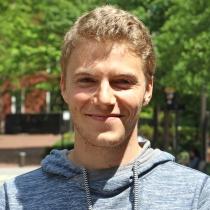
Marin C Butori
What is your next adventure?
Right after graduation, I will go to [home] to France for two months to visit friends and my family. Then, I will move to New York [City] to begin a consulting position with Price Waterhouse Coopers. I’ll be helping clients deal with technology issues in their companies.
Did you have any previous co-op, internship, or research experience in this area?
I did an internship last fall with PWC and it worked out well. Price Waterhouse Coopers recruits engineers because they are analytical problem solvers. They can put problems into equations and break things down to system and subsystem levels for analysis. I have an undergraduate degree in engineering, and they thought the MS degree in aerospace from Tech was a real plus. At Tech, I did research with Prof. Marilyn Smith on aerodynamism, using reduced order modeling to focus on the interaction between rotorcraft and tethered loads.
What about your next adventure are you most looking forward to?
I studied engineering because I’ve always been good at science and I liked the logic of engineering. At PWC, I am hoping I will find something else I will feel passionate about. I know I won’t be doing IT consulting for the rest of my life, but, right now, it will really open doors. After studying engineering, I realized that I’m not built to be an engineer. There’s too much coding. But I did learn that I love the aerospace industry, and so I’m hoping I will be able to find a way back to it, perhaps through management consulting.
How did your educational experience at Georgia Tech help you to achieve your goal?
First of all, I’ve always thought aerospace engineering is the most challenging area of engineering, with lots of applications that won’t be going away any time soon. I really got that confirmed here at Georgia Tech. My work with Dr. Smith was the first real work experience I’d had in engineering and it taught me a lot. With code, you might spend three days on three lines of code. And it seems like a lot of work for you, but when you have to show your work to Dr. Smith and prove you’ve been really working hard, it doesn’t look so good. Dr. Smith helped me to break things down to smaller problems, solutions, and results. This will definitely help me with consulting clients.
What advice would you give to an underclassman who would like to follow the same path?
Give yourself 100 percent to research. It’s worth it. It’s why you come to Georgia Tech. You will take away from your degree what you contributed to it. And if you are an international student, it’s important to realize that you will be working on a special research problem for two semesters, not one, and you will be expected to draw unique conclusions. So be prepared.